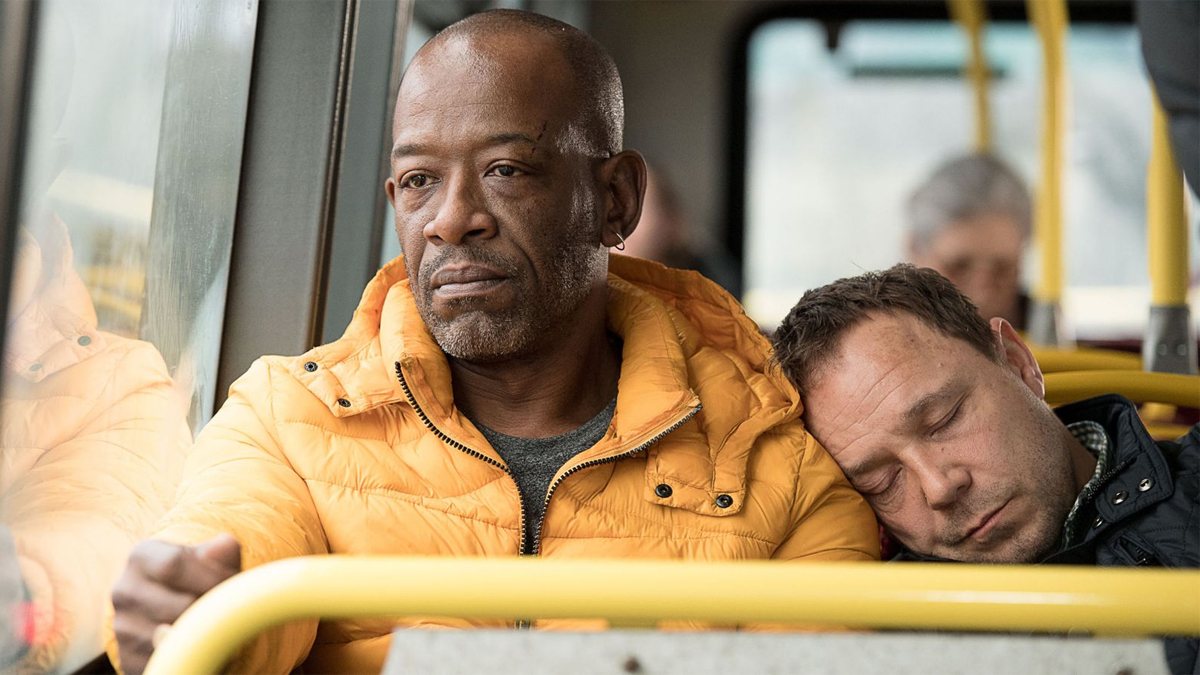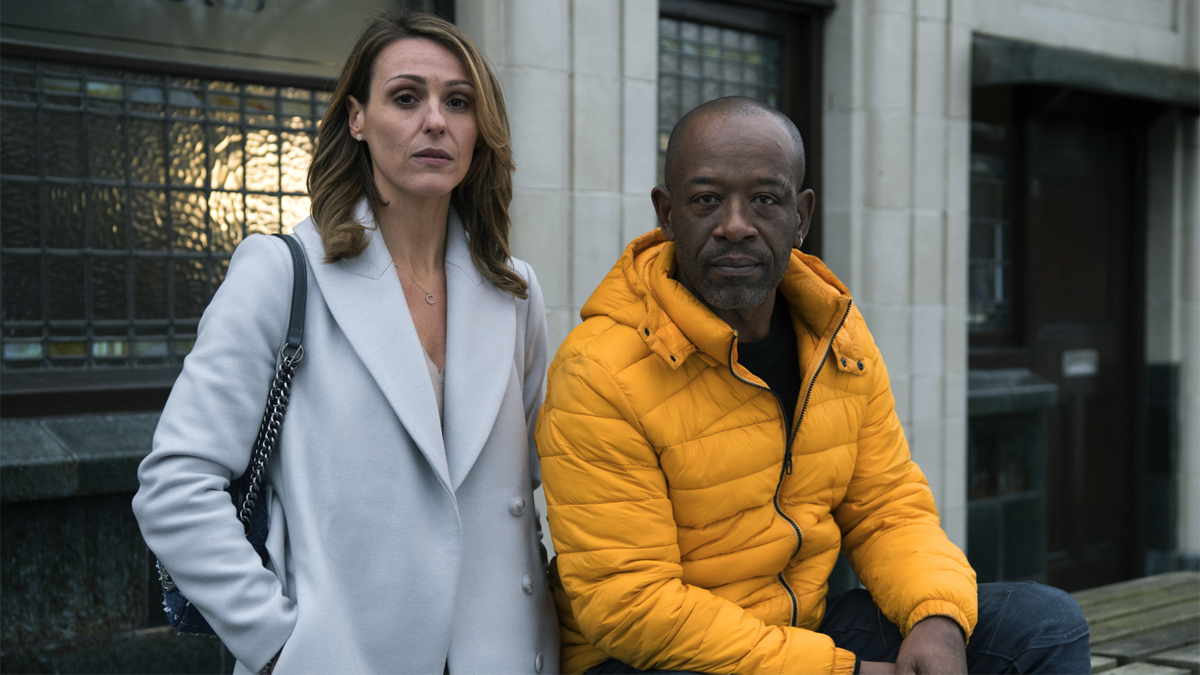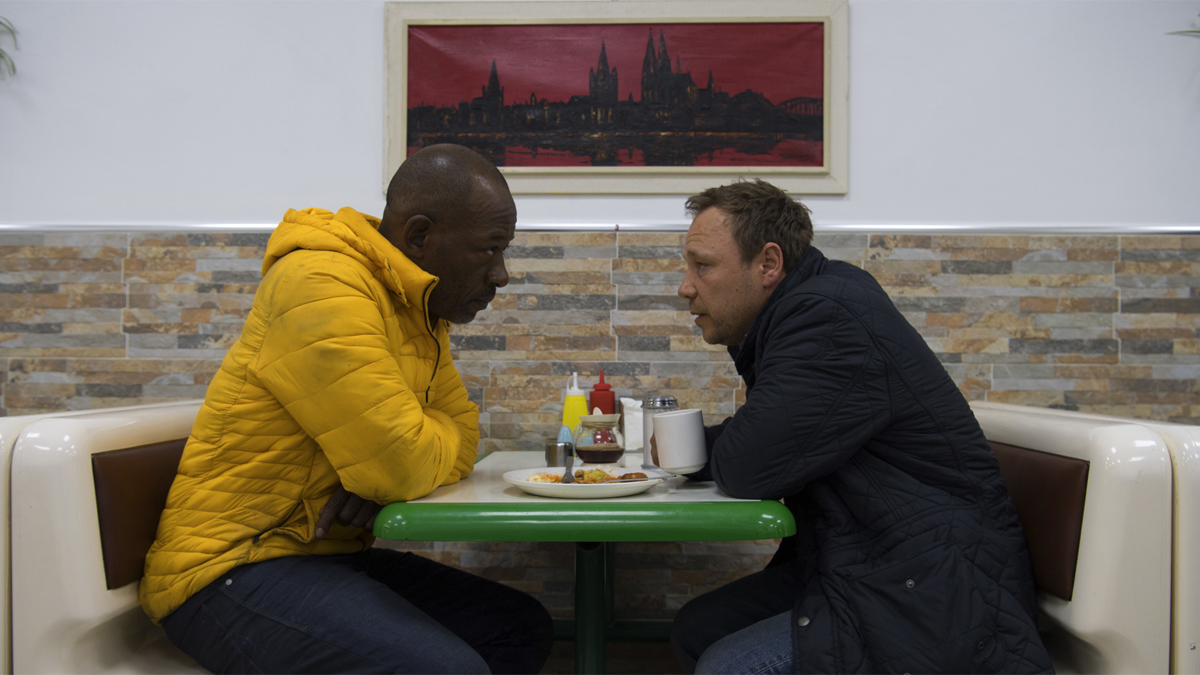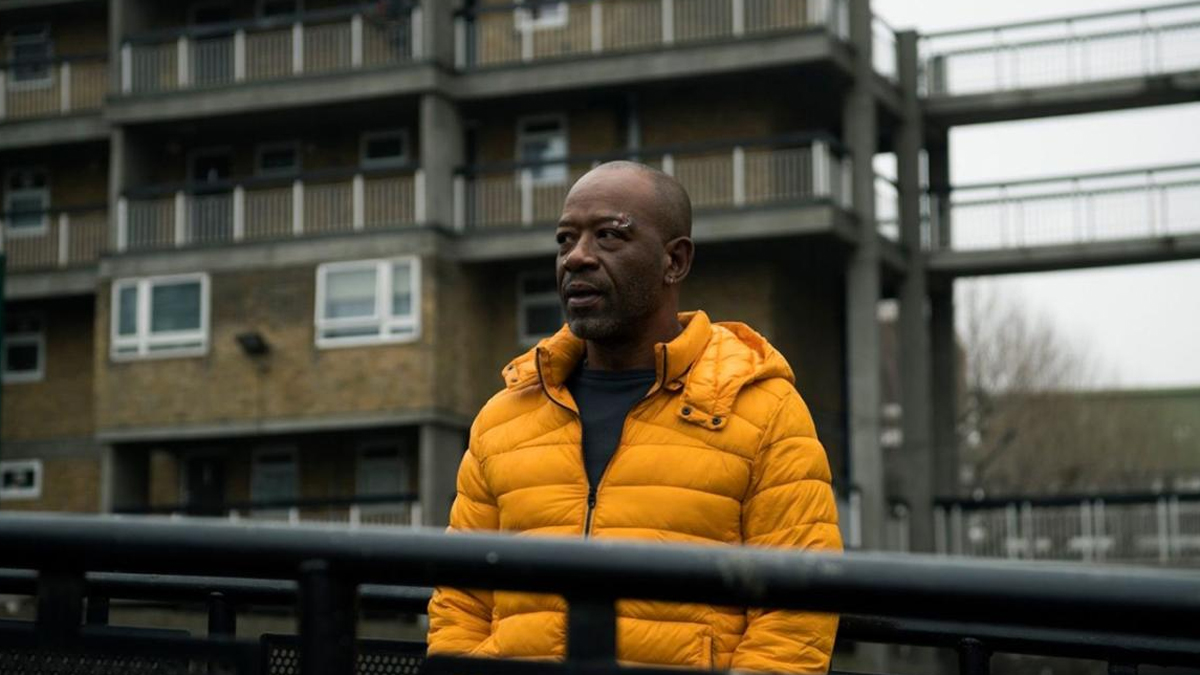Save Me Review: An Absorbing Character-Based Thriller
Written by and starring Lennie James, Save Me is a different kind of thriller built around excellent performances. Spoilers ahead…
This article comes from Den of Geek UK.
Spoiler warning: this review refers to plot details for all six episodes
TV detectives often come with a gimmick. This one’s an amnesiac, that one’s an addict, the one over there in the posh coat is a high-functioning sociopath. Nelly Rowe’s gimmick in Sky Atlantic thriller Save Me is that he isn’t one – a detective, that is. Nelly’s just a bloke. You’ve passed him on the street and met him in pubs and seen him on the bus. He’s a womaniser and a barfly, a bit of a drifter, a lot of a drinker, and a fixture in the South-East London estate where he grew up.
The estate, with its local pub and high-rises, is more than just the backdrop to Save Me, it’s the fibre of the story. Lead Nelly, played by writer-creator Lennie James, is as indivisible from its streets and stairwells as he is from his now-trademark yellow Puffa jacket. From now on, Save Me viewers will see either in real-life and think of Nelly.
That’s the power of a character like his; he’s irrefutable. Lennie James playing Nelly Rowe in Save Me is the same blessed mix of writing and performance as Sarah Lancashire playing Catherine Cawood in Happy Valley or Ian McShane playing Al Swearingen in Deadwood. These characters just are. You could no more contain them inside a television screen than you could keep an oil tanker in your bath. In their scale and depth and sheer charisma, they make other TV characters feel weightless.
The rest of Save Me’s ensemble would need to be something special not to seem flyaway by comparison, and happily, they’re just that. Getting your mates in to do a job for you doesn’t always work out for the best, but when you’re Lennie James and your mate is Stephen Graham, it really couldn’t go better. Graham and Suranne Jones are some of the best around, and, along with Jason Flemyng, Susan Lynch and Kerry Godliman, make up one of the strongest TV debut casts in years.
The central cast and characters are so well-drawn that a proposed second series would be welcome despite it requiring series one to end, some would say frustratingly, on an ellipsis rather than a full stop.
Save Me is a thriller that goes to very uncomfortable places (and I don’t just mean Lewisham). Its plot—a thirteen-year-old girl is kidnapped by a paedophile ring—reads on paper as nastily sensationalist. In execution, it’s utterly absorbing. The dialogue, which bounces energetically with South London slang, is performed with the kind of overlapping naturalism rarely seen in crime thrillers. The events may be heightened and unlikely but they’re anchored by a group of characters that exist with such force, you buy it wholesale.

The centre of those characters’ universe is The Palm Tree pub, the local where they gather to chat shit and drink. They’re a community, the sort of regulars that either repel outsiders like flesh gently pushing out a splinter, or grow new tissue around them, trapping them for life. Suranne Jones’s character Claire hasn’t been to The Palm for over a decade, but when she returns there, she fits back in as if nothing’s changed.
Claire left the estate behind for a better-heeled future with her music promotor husband, adoptive dad to her teenage daughter Jody. When Jody goes missing and signs point towards her kidnapper being linked to Jody’s birth-father Nelly, Claire is drawn back in to her old life.
Suranne Jones convincingly straddles both of Claire’s worlds—the one with the pricy jewellery and swimming pool, and the one with the pissed karaoke and the outdoor sex with her ex. Nelly and Claire clearly never lost their sexual chemistry – so why did she choose to raise her daughter without him?
Nelly’s a deadbeat, is the answer. He’s jobless and between addresses, charming the women he sleeps with (and cheats on) into giving him a bed, a car… whatever it is he needs. He has a violent temper, starts his day with a drink, uses people for what they can give him and has made no effort to be a father to Jody. In short, Nelly’s no hero.

When Jody leaves a video message saying she’s going to stay with her estranged father, to whom she’d apparently been chatting online, Nelly’s arrested on suspicion of abduction. To begin with, Save Me leaves an inch or two of doubt over whether Nelly was involved in Jody’s disappearance. James is such a charismatic performer that the possibility of his character’s cluelessness being a cover for darker motives is there. As Claire says to the police, you don’t know him, he’s manipulative and deceitful.
She’s right about that. It’s quickly apparent that the ‘me’ crying for help in the show’s title (it was originally called Gone) isn’t just Jody but Nelly too. He’s the one who needs to redeem himself and be saved through taking on the responsibilities—and pain—of fatherhood. If that sounds trite and Hollywood-ish, then it’s testament to this whole production that it never feels that way for a minute. Save Me is beautifully resistant to overstatement.
It’s also beautifully weird. As well as those accomplished performances, director Nick Murphy has helped to create a world hardly ever seen on TV: a council estate populated by bizarre originality and whimsy, not humdrum repetition. In strange vignettes of life around Nelly’s estate, Murphy emphasises the heartening idiosyncrasies of the people who live there. A woman walks two dogs, one enormous, the other humorously small. A child sits in an inflatable boat wearing a snorkel in the middle of an empty playground. The comedy of these moments provides a momentary lift from the increasingly grim story of Jody’s abduction.
Grim is decidedly the word for it. Save Me’s story is as unsettlingly grubby as they come. To find Jody, Nelly searches through online images of child sexual abuse, finding a clue that leads him to a local club where underage girls are sexually abused. To get closer to Jody, Nelly has to infiltrate the club undercover, posing as a newbie child abuser. That’s where Stephen Graham’s character Melon, a man with a previous conviction for sexual activity with a child, comes in.

To draw a brief comparison, Save Me is one of two TV thrillers to feature a character convicted for child sexual abuse currently on air. The other is ITV’s Marcella, which paints its paedophile character as an utterly remorseless, sneering monster. He’s there as the worst kind of boo-hiss villain, adding yet more tasteless sensationalism to an already tastelessly sensationalist story. Save Me, while in no way an apologist for the horrific crimes it represents, does so much more.
Save Me goes under the surface with Melon. It investigates the lies he tells other people and himself about his behaviour. “I barely touched her,” he says to his girlfriend Bernie, about an underage girl he met at the club Nelly forces him to join. “Like you barely touched me?” she retorts. Complicating matters is that Melon’s spent conviction was for sexual contact with an underage Bernie. She waited for him to get out of prison, thinking it all a great romance, for which her family more or less disowned her.
Melon’s self-hatred and need to believe he’s not the same as other abusers becomes apparent in later episodes. Whether it’s a bare-faced lie or one he told himself to excuse his perverse tastes, Melon says he’s been secretly visiting child sexual abuse websites not for gratification but to look for Jody. At times he seems like a manipulative, opportunist liar, at others he seems genuinely to be struggling and wanting to help his friend. When it’s the former, you want to see him punished and Bernie deprogrammed and safe; when it’s the latter, watching Nelly pressure Melon further and further into the world of fellow abusers feels like watching a recovered heroin addict being cruelly offered a needle. The complexity and shifts are the point, and Stephen Graham is an actor talented enough to move convincingly between every shade of nuance.
Other supporting characters are less explored, but the friendship between Nelly and his childhood friend Stace (Susan Lynch) feels satisfyingly lived-in. Thomas Coombes steals numerous scenes as Goz, purveyor of weed and provider of weird bar facts. Nelly’s taken-advantage-of girlfriend Teens, played by Kerry Godliman, is utterly recognisable in her loneliness and weakness for him.

The revelation of who impersonated Nelly online and had Jody taken is perhaps the series’ weakest move, but by that point, you’re so caught up in the characters that it’s easily shrugged off. A power-flipping scene in which Claire sexually assaults the villain to gain information on her daughter’s whereabouts is uncomfortable and new and once again, completely sold by Suranne Jones. Having Claire go to such extremes also soothes the discomfiting itch throughout that Jody’s mother has been side-lined to inaction while her feckless father pursues his own heroic redemption – a gender pattern all too familiar in the movies.
Does Nelly end series one a hero? Not exactly. Does he end it a father? Not quite, though he’s a lot closer to being both than he was when this twisted story began. I’ll tell you who is a hero though: Lennie James, Nick Murphy, World Productions and everyone involved in bringing us a TV thriller this fresh and absorbing.
